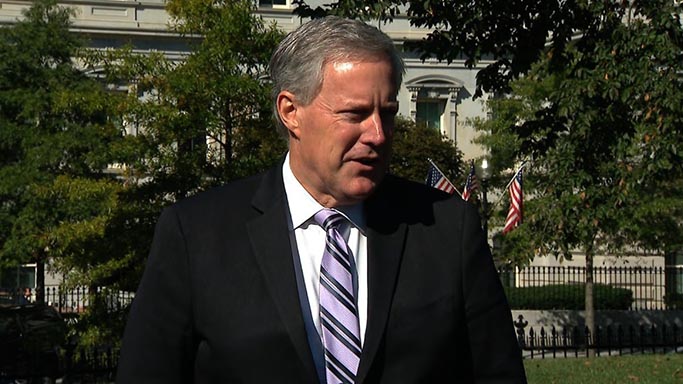WASHINGTON, (Reuters) – The White House sent contradictory messages about President Donald Trump’s health yesterday with a senior official saying Trump’s vital signs were “very concerning” even as doctors talked of a patient recovering well from COVID-19.
The team of doctors said yesterday morning that Trump’s condition was improving and that he was already talking about returning to the White House. One said Trump had told them “‘I feel like I could walk out of here today.’”
Within minutes, White House chief of staff Mark Meadows gave reporters a less rosy assessment.
“The president’s vitals over the last 24 hours were very concerning and the next 48 hours will be critical in terms of his care. We’re still not on a clear path to a full recovery,” Meadows said, speaking on condition that he not be identified.
Three hours later, Meadows told Reuters that Trump was doing “very well” and that “doctors are very pleased with his vital signs”.
Meadows did not respond to a request to clarify the discrepancy in his comments.
The president’s health is a matter of crucial public interest and the conflicting accounts created confusion as he battles a potentially life-threatening illness.
Trump was flown on Friday from the White House to Walter Reed National Military Medical Center near Washington just hours after he was diagnosed with COVID-19.
Another source who was briefed on Trump’s condition said the president was given supplemental oxygen before he went to the hospital.
The decision to hospitalize Trump came after he had experienced difficulty breathing and his oxygen level dropped, according a source familiar with the situation.
White House doctor Sean P. Conley told reporters outside the hospital on Saturday that Trump had not experienced difficulty breathing, and was not given oxygen at Walter Reed.
“The team and I are extremely happy with the progress the president has made,” Conley said. He declined to give a timetable for Trump’s possible release from the hospital.
Dr. Amesh Adalja, an emerging infectious disease professor at Johns Hopkins University, said, “If a person is hospitalized we don’t consider it a mild case anymore.” But he said it was difficult to gauge Trump’s medical status based on the information provided publicly so far by his doctors.
Trump tweeted praise for the medical staff at Walter Reed, and other institutions that have joined them, saying they are “amazing” and that with their help, “I am feeling well!”It was not clear whether Trump or someone else with access to his Twitter account sent the tweet.
The White House has said Trump will work in a special suite at the hospital for the next few days as a precautionary measure. He had no public events scheduled on Saturday.
The diagnosis was the latest setback for the Republican president, who is trailing Democratic rival Joe Biden in opinion polls ahead of the Nov. 3 presidential election.
A Trump adviser said his campaign team’s immediate plans, at the president’s urging, is to have surrogates do television appearances to make the case for his re-election.
Trump has repeatedly downplayed the threat of the coronavirus pandemic this year, even as it has killed more than 200,000 Americans and hammered the U.S. economy.
Conley said Trump had received a first dose of a five-day course of Remdesivir, an intravenous antiviral drug sold by Gilead Sciences Inc that has been shown to shorten hospital stays. He is also taking an experimental treatment, Regeneron’s REGN-COV2, one of several experimental COVID-19 drugs known as monoclonal antibodies, as well as zinc, Vitamin D, famotidine, melatonin and aspirin, Conley has said.
Trump announced on Twitter early on Friday that he and the first lady, Melania Trump, had contracted the virus.
He is at high risk because of his age and weight. He has remained in apparent good health during his time in office but is not known to exercise regularly or to follow a healthy diet.
A number of other prominent Republicans have also said they tested positive for COVID-19 since Trump’s announcement, including Republican Senators Mike Lee, Thom Tillis and Ron Johnson, former White House senior adviser Kellyanne Conway, and former New Jersey governor Chris Christie. Christie said he checked himself in to a hospital on Saturday as a precaution.
Vice President Mike Pence, who would take over presidential duties if Trump became severely ill, tested negative, a spokesman said. The former Indiana governor, 61, is working from his own residence about three miles from the White House.
ELECTION DAY LOOMS
The Trump campaign on Friday suspended in-person campaign events involving the president or his family. But Pence will continue stumping for the president and Trump’s campaign said on Saturday that Pence will host an Oct. 8 event in Peoria, Arizona.
Trump’s campaign manager, Bill Stepien, also tested positive for COVID-19 on Friday and will work from home, according to a senior campaign official.
Biden pulled ads attacking Trump off the air but otherwise continued his campaign, traveling to Michigan on Friday after testing negative for the virus.
In a Twitter post on Saturday, Biden urged Americans to don masks. “Don’t just do it for yourself. Do it for the people you love.”
Pence’s Oct. 7 debate with Democratic vice presidential candidate Kamala Harris will go forward as planned, organizers said.
The virus could complicate Trump’s push to install conservative judge Amy Coney Barrett on the Supreme Court.
Lee and Tillis are both members of the Republican-controlled Senate Judiciary Committee, which is scheduled to begin hearings on Barrett’s nomination on Oct. 12.
Yesterday, U.S. Senate Majority Leader Mitch McConnell said all Senate floor activity would be rescheduled until after Oct. 19, but committee work, including Barrett’s confirmation hearing, would continue.

